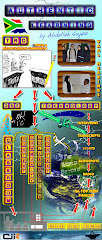“Youth is a kind of madness.” Arabic proverb.
Time Line: Early years of Islam in the Prophet hood of Muhammad (S.A.W).
Event: Preparation for the Battle of Badr.
The context: 313 Muslims ready to battle against 1000 well armed soldiers.
An incident in focus: Prior to the battle, two young boys came to Muhammad (S.A.W) requesting that they want to be part of the battle against the army of Abu Jahl. Muhammad (S.A.W) suggested that they wrestle each other and the better of the two would be part of the 313. The two boys began wrestling and the older of the two pinned the younger twice. On the third bout, the younger whispered into the ear of the older that he should allow him to pin him down so that both of them can be part of the 313, and so it happened and they were part of the army that won the day for Islam.
In the great era that followed, history bears testimony to the legacy of young Muslims who became governors, army generals, thinkers, writers and teachers that set the basis for Islam to foreground leadership in the hearts and minds of young people.
It was in Makkah again that Muhammad (S.A.W) walked to Taif in the blistering heat of the desert to invite the people to the worship of one Allah without partners but, his (S.A.W.) invitation led to his stoning. Muhammad (S.A.W) on that occasion cried to Allah complaining of his weakness in strength and his unpopularity in the eyes of the people such that Allah sent an Angel down to seek what refuge Muhammad (S.A.W) would want even it be that the mountains be commanded to crush the inhabitants of Taif. Muhammad (S.A.W) made the prayer for their forgiveness and mentioned that if they did not embrace Islam then, their children to follow would embrace the faith. It happened. Muhammad ibn Kassim just 17 years at the time, long after the demise of Muhammad (S.A.W) from Taif became the leader of an army that set foot to India and brought Islam to that vast land. Records show that it was not a crusade of rape, pillage and plunder rather, it was a battle of minds and hearts with traditional battles fought only a few times on the outskirts of villages and towns and with one siege of a fortress in Sindh.
A critical appreciation of the above:
When you study the proverb quoted above, you will realise with the current immoral onslaught by the media on the youth, the youth seem to be maddened with ecstasy to indulge in a tremendous sensate culture of selfishness. In their madness they have taken to a life of materialism such that parents today are caught between the devil and the deep blue sea to strike a balance in fulfilling the needs of their children. Their madness is compounded by the fact that the youth do not see themselves as leaders because they want to enjoy life and ‘drink life to the lees’ before any major responsibility dawns upon them. The responsibilities of marriage, work, and career progression, community forums so and so forth are not attractive to them because it appears as a legacy of burden to them. In effect, they become “wild men, who caught and sang the sun in flight, and learn to late, they grieved it on its way, do not go gentle into that good night.” In the end they become sore losers because they need to pass the buck on until the buck stops when death came a calling and their life filled a scroll of emptiness of good deeds.
The master of examples
To combat this madness the example of Muhammad (S.A.W) is remarkable in that he espoused leadership and its qualities in everyone that became Muslim – the young and the restless, the bold and the beautiful, the older generation, the poor, the weak and the women, and that is how he filled the days of his life. The event before the great battle of Badr reflected above conveys many illustrious points. Let us delve into a few.
Firstly, the youth came to Muhammad (S.A.W) and requested to be part of a battle and he affirmed them such that they rose above the pettiness of boyish dreams to the valour of men.
Reflect on how we respond to our youth who come a-calling saying that they want to be the next president of the country – probably, we would mock and jeer at them in such a way that we dash all their hopes to even dream, never mind thinking big. In effect, we dilute all their potentials in the quagmire of hedonism. When we did this or when we do this we have not affirmed our youth. In fact, we have destroyed them and made them fodder for a lost cause.
Secondly, when Muhammad (S.A.W) made the two boys wrestle, he made them aware that life is challenging and a gauntlet. The boys learnt through their desire of wanting to fight in Allah’s cause, to unite and this made them perceive that unity is strength. They learnt how to fight life’s challenges as individuals within the domain of the Quran and Sunnah.
Ponder on the above. How many times we have kindled the blazing flames of animosities in our children when others out do them at certain of life’s challenges: end of year reports, 1st and 2nd positions, best sportsman so and so forth? We have not taught our children that in life you have to fight your own battles rather, we made them think and still insist on making them think that Mummy and Daddy will be around to fight your battles. In this way we dissolved any capacity of leadership they might have had into the myriad of self-indulgence and dependency on others. In effect, we taught how to become reliant on mummy and daddy’s arrogance and denial that other boys and girls have better potentials than their own darlings.
Thirdly, when the boys were given the honour to go into battle, they were placed on platform of men – men around the Messenger (S.A.W). In this way they managed to defame the disbelievers by taking Abu Jahl out. History bears testimony that Muhammad (S.A.W) mentioned to the effect that the martyrs and soldiers of Badr are unparalleled by all noble companions that followed. When you look at the statistics, two youth made up that list and it was them who took the leader of the disbelievers out making his head roll in the desert sand. In the art of war the youth fought hand to hand combat. It is a distant reality of how Allied forces first bombed Iraq before facing the Iraqis. Today they are called insurgents only because they are defending their land – our Muslim land.
Introspect on the above and ask yourself just how often you behave like a child in front of your child or, how you behave like a spoilt brat in front of your child or, how you woo the opposite sex in front of your child or, how you would whine about a lack of fashionable clothes in front of your child or, how you would crave for a new material possession like a car or a watch in front of your child? In all of this you did not show any sign of leadership rather, you showed your child what should lead you and who should lead you – materialism should lead you and your desires should lead you. In effect, you did not allow your child to come onto the platform of men/women around the Messenger (S.A.W).
The question that should now hit home like a cold slap on your face on a winter’s morning is: Youth Leadership! Do you know what it is?
The realisation is that you do know but not aware of how it filters down from you – the parent. Long before the child attends a school and becomes the protégé of his/her teachers; we the parents have taught our children how to find fault with the teachers in how they have imparted knowledge to them.
Now consider the example of Muhammad ibn Kassim above. At the age of 17 he was a commander of an army that was the alchemy of our great grandparent’s hidayaat into the fold of Islam. All this began because Muhammad (S.A.W) affirmed the youth in his dua despite the arrogance of the parents that prevailed over them.
Pit your energies to make sense of the above. We make no concerted effort on ourselves as adults to impact positively on our children. In fact, how many times do we hear of parents being killed by their own children, how many times adults frequent gambling dens and have secret rendezvous with call girls only to ‘bump’ into their own children on the way in or out? In all of this; what dua can the desperate man or woman make because his/her path was not towards inviting to Allah therefore, later generations became fodder for a lost cause.
You see if you tread the path of Allah and Muhammad (S.A.W) and if you get uphill and in that condition you make dua for the youth of Islam, that dua reaches Allah with more vigour because it’s emboldened with Allah’s name and registered with life pattern of Muhammad (S.A.W).
As learned adults of our time are we affirming the potentials that are becoming apparent in the youth in our chargers?
The general apparent answer – YES, We have affirmed their potentials of driving – they get our permission to drive without licence. YES, We have affirmed their potentials of choice – they choose their night outs at parties, casinos etc. YES, We have affirmed their judgements – they get us to believe just how wrong a teacher is, how another school is better than others and much more. YES, We affirmed their decisions – they leave our homes dressed as if they are unclad (wearing of transparent clothing and body revealing outfits), boys wearing earrings, gold chains and looking like girls and girls looking like boys – YES, In all of this we have affirmed their potentials.
The question remains – If we have affirmed our youth in ways above what has stopped us from affirming them to be leaders?
Youth Leadership therefore, is the reflection of the adult world on the child and how the child is made part of the responsible adult world. When you turn to the schools and their forums that allow for youth leadership you have to see just how adults in authority do espouse leadership or, actually dampen the cause for it. Furthermore, look at all community forums and see how we have made the youth part of doing things for the weak, the poor and the destitute – generally their absence in these forums is great. In effect, we realise that we do not teach the youth how to lead; we teach them how to make excuses for leadership roles. Therefore, we need to rid our minds and hearts of the misnomer that youth leadership is handing over the reigns of leadership to young people – it’s teaching them to be leaders. The anecdotes above are proof that young people were affirmed by adults who did not prefer taking the backstage and allowed others the forefront to lead because many a times unworthy people take the reigns of leading the young and the restless and this in itself heralds the signs of Qiyamaah.
In passing an incident related to youth leadership astounded me. A man of repute mentioned that a youngster is becoming proud and the contributing factor is that he is the chairperson of particular society in the school and that these societies promote these negative tendencies. I was taken aback because, in all of life’s societies, halqas, madressah management and mosque trustees I find adults; and they have made an impression on what a person should be in a leadership position and for us not to teach the ‘becoming arrogant’ youngster correct leadership qualities, we will have a society of people who will be led by arrogant, unapproachable and inaccessible leaders.
Imagine for a moment if all the Ambiyaa (A.S) took the backstage when they were empowered to lead and allowed others to lead – what would our condition be today? I believe we would still be in the throes of ignorance when people used to bury their daughters alive. Furthermore, imagine if the Khulafaa-e-Rashida (R.A) took the backstage when they had the knowledge to lead, where would we be today? I believe we would have dwindled into oblivion and we would have reinstated the age of ignorance where people used to bury their daughters alive.
In essence it takes courage to lead and more to provide opportunities for the youth to be trained as leaders because if we do not do so, we will not show the history of Islam that espoused leadership in the youth.
Finally, it was Ali (R.A) who took an independent decision to embrace Islam when he was very young and Muhammad (S.A.W) affirmed his decision and taught him how to be a practising Muslim publicly and privately so much so that Ali (R.A.) became the fourth Caliph of Islam, who faced great challenges with nerves of steel because in his youth he was shown that in life you face your own struggles and Allah is your supreme helper when the cause is for HIM.
In all of the above you found that the youth were affirmed in public and they derived the matching personal life from Muhammad (S.A.W) in that he taught them the many aspects of leadership. Muhammad (S.A.W), the Caliphs (R.A), all the Companions (R.A), the Four Imams (Allah be pleased with them), the Tabi’een, the Tabi’Tabi’een and the Awliyaa that followed did not take the backstage rather, they produced leaders by showing what leadership should be. Despite the fact that the Four Imams did not take part political office during the reign of their respected Caliphs at the time, they did not stop short from affirming the youth, the men and people at large on the essence of taking charge of one’s life according to Allah and HIS Messenger (R.A.). It was, in these gatherings, that Spain became a Muslim land because people were affirmed to take the lead when their potentials became apparent to the learned adults of the time.
Please acknowledge the following:Abdullah Sujee writes for the Al-Huda Magazine. All his articles can be accessed on is blog: http://rendezvousofminds.blogspot.com/index.html
Thursday, June 5, 2008
Subscribe to:
Post Comments (Atom)







No comments:
Post a Comment